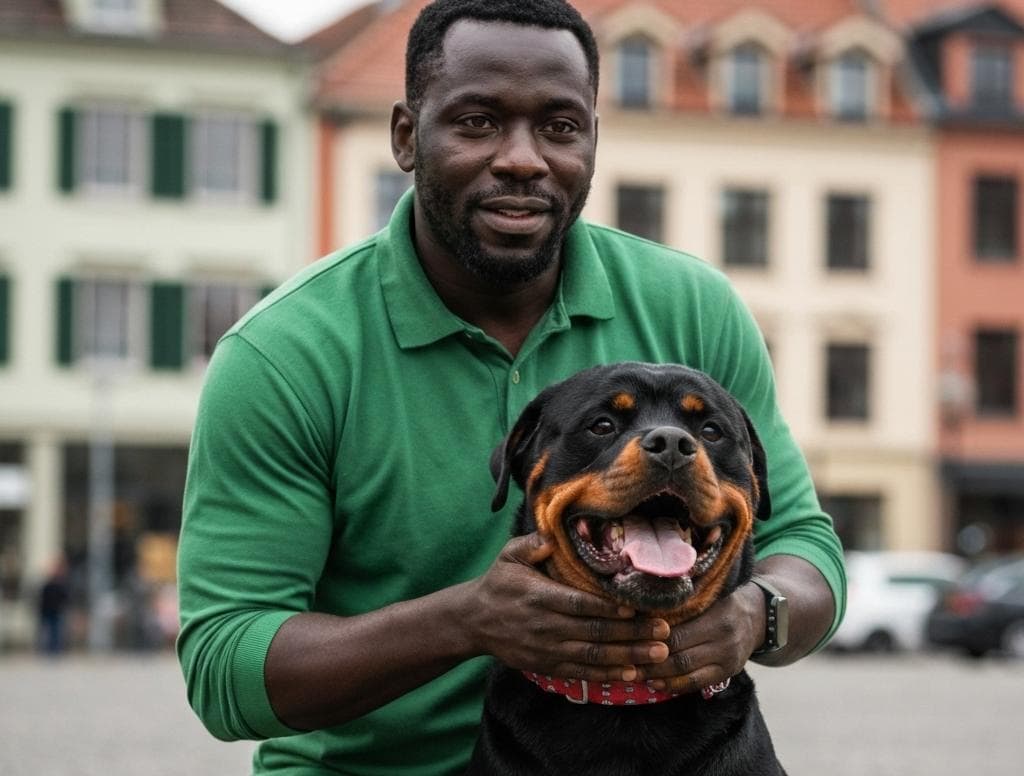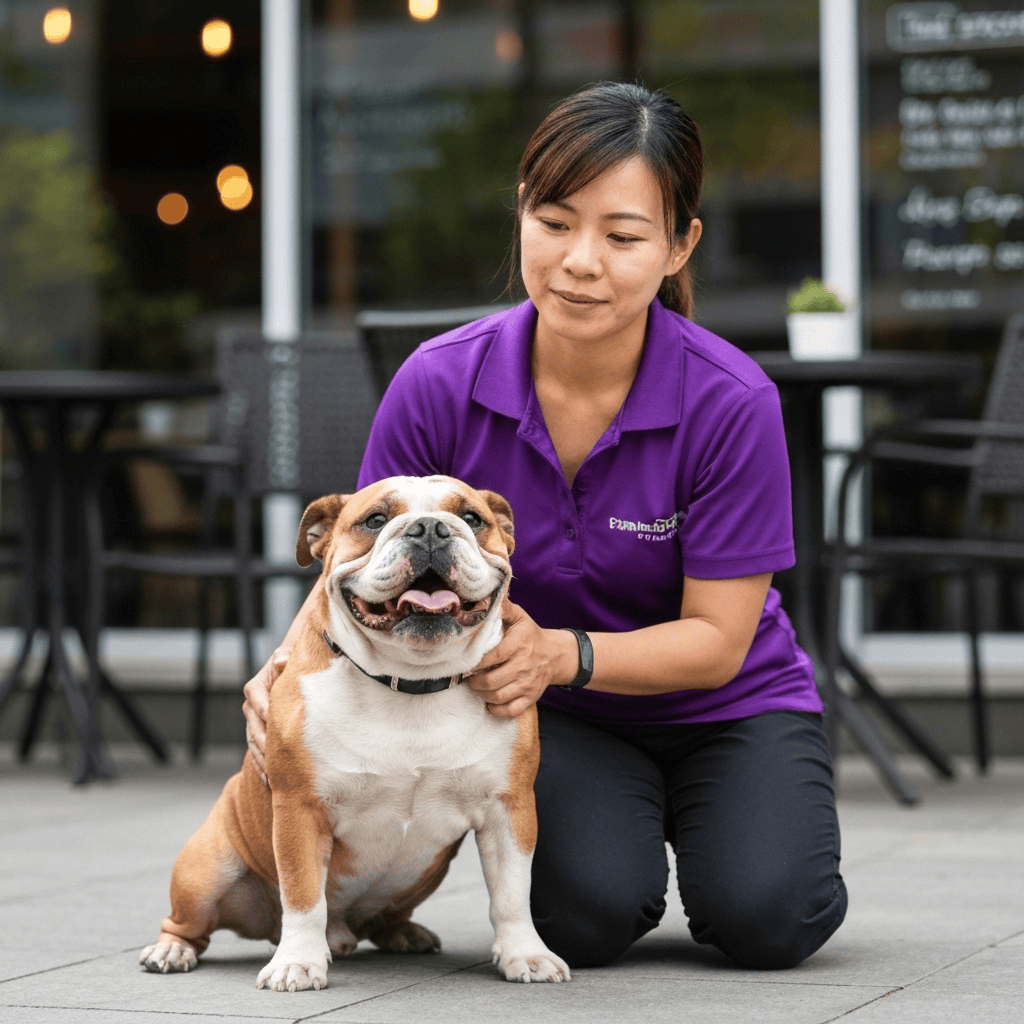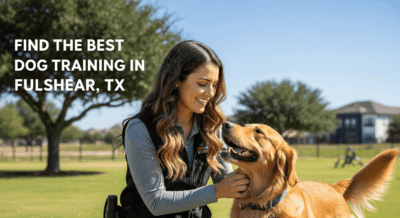Your Complete Guide to Choosing a Dog Trainer in Fulshear
When you’re walking your dog through Cross Creek Ranch or navigating the busy parking lots at LaCenterra, you want a pup who listens and stays calm around distractions. Finding the right trainer makes all the difference between a dog who pulls you down FM 1093 and one who walks nicely beside you.
Choosing dog training in Fulshear means looking beyond flashy websites to find someone who truly understands how dogs learn. The best trainers know that what works in a quiet living room needs to translate to real life – whether that’s greeting visitors at your front door or staying focused when kids ride by on bikes.
How to Choose the Right Trainer
The foundation of good training is positive reinforcement. When your dog gets rewarded for making good choices, they’re eager to repeat those behaviors instead of feeling stressed or confused. This approach works especially well in our busy suburban environment where your dog encounters everything from delivery trucks to neighborhood barbecues.
Look for trainers who plan to practice in real situations. Sure, your dog might sit perfectly in your kitchen, but can they do it when another dog walks by during your evening stroll? The best trainers start at home where your dog feels confident, then gradually add the distractions they’ll face around Fulshear and Katy.
Professional credentials show a trainer has invested in education beyond weekend workshops. Respected certifications include CPDT-KA, KPA-CTP, and general dog trainer certifications from established organizations. For serious behavior issues like aggression or severe anxiety, look for specialists with credentials like IAABC-CDBC or CBCC-KA. Training from a CTC program also indicates solid science-based knowledge.
Don’t forget the business basics. Texas doesn’t require trainers to have special licenses, but responsible professionals carry liability insurance and have clear policies about cancellations, emergencies, and what happens if training isn’t working.
Common Dog Training Methods Explained

Most Fulshear families start with basic obedience – teaching sit, down, stay, come when called, and polite greetings. These aren’t just party tricks. They’re the foundation for a dog who can enjoy neighborhood walks, visit pet-friendly stores, and make friends instead of enemies with your neighbors.
Puppy training focuses on the critical early months when your young dog’s brain is like a sponge. Socialization means carefully introducing them to different sights, sounds, and experiences so they grow up confident rather than fearful. Potty training and learning not to bite too hard during play are equally important parts of puppy education.
When dogs struggle with fear, reactivity, or separation anxiety, they need behavior modification rather than basic obedience. This involves carefully changing how your dog feels about their triggers through techniques like desensitization and counter-conditioning. Progress tends to be slower but leads to lasting changes in your dog’s emotional responses.
Some families have specific goals like service dog training or therapy dog training. Ethical trainers will be honest about whether your dog has the right temperament and what’s involved in these specialized programs.
Training comes in different formats. In-home dog training lets you work on problems in your actual environment. Group classes provide socialization and are often more affordable. Private lessons give you individualized attention. Day training means the trainer works with your dog while you’re at work, then teaches you what they learned. Board and train programs take your dog for intensive training away from home.
Average Cost of Dog Training in Fulshear (Updated for 2025)
Training costs around Fulshear vary based on the trainer’s experience, credentials, and how far they need to travel. Here’s what most local families can expect to pay.
| Service Type | Average Cost (Fulshear/Fort Bend County) |
|---|---|
| Group classes (4–6 weeks) | $170 – $320 |
| Private in-home lessons (60–75 min) | $120 – $200 per session |
| Puppy packages (4–6 lessons) | $380 – $700 total |
| Day training (trainer works your dog, plus coaching) | $600 – $1,000 per week |
| Board and train (2–4 weeks) | $2,100 – $4,800 total |
| Behavior consultation (fear, reactivity) | $150 – $260 initial session |
Trainers with advanced credentials or those specializing in complex behavior cases typically charge more. If they’re traveling from central areas like Katy or Sugar Land, expect additional travel fees. Many offer package deals that reduce the per-session cost, and some provide a brief free evaluation over the phone to discuss your needs.
Questions to Ask a Potential Dog Trainer
Before committing to any training program, have a conversation with potential trainers to make sure they’re a good fit:
- What training methods do you use, and how do you ensure the experience is positive for dogs?
- What credentials or education do you have in dog training and behavior?
- How will you customize the training to fit my dog’s personality and our specific goals?
- Do you recommend group classes, private lessons, or another format for our situation?
- What’s included in each session, and what’s the total investment including any travel fees?
- Do you carry liability insurance?
- How do you measure progress and decide when to increase difficulty?
- For behavior issues, do you work with veterinarians when needed?
Practical Rules and Local Considerations in Fulshear and Fort Bend County
Living in Fort Bend County, Texas means following certain rules that affect how and where you can train your dog. Understanding these guidelines helps you stay compliant and makes training go more smoothly.
Dogs must be leashed in public areas and under your control at all times, except in designated off-leash zones. Texas requires current rabies vaccination for all dogs – keep those records handy. Microchips and ID tags help ensure lost pets make it home safely.
Excessive barking can lead to neighbor complaints, so training for calm behavior and providing adequate mental stimulation prevents problems. While Texas doesn’t require special licenses for dog trainers, many facilities and homeowner associations require proof of liability insurance for commercial activities in common areas.
For county-specific pet services and information about lost or found animals, check Fort Bend County Animal Services. For statewide vaccination requirements, visit Texas DSHS Rabies.
Local Fulshear Resources for Dog Owners
The Fulshear area offers several excellent spots to practice training and socialize your dog:
Pawm Springs Dog Park in Sugar Land features separate areas for large and small dogs with water features that most pups love. Check current hours and rules at City of Sugar Land.
Millie Bush Dog Park at George Bush Park near Katy offers multiple fenced sections and ponds for swimming. Find details at Harris County Precinct 3 Parks.
Katy Dog Park provides another popular off-leash option just north of I-10. Brazos Bend State Park offers miles of on-leash trails where you can practice obedience around wildlife and other park visitors. Visit Texas Parks and Wildlife for current conditions.
Fort Bend County Animal Services Pet Adoption Center in Rosenberg provides adoption services, microchipping, and other county resources. Always follow posted park rules, bring waste bags and fresh water, and remember that commercial training classes in public parks typically require special permits.

Common Questions About Dog Training in Fulshear
How much does in-home dog training cost?
Most in-home trainers in the Fulshear area charge $120 to $200 per session. The final price depends on the trainer’s experience, how far they travel, and how long each session lasts.
Is in-home dog training worth it?
For many families, absolutely. Working in your actual home and neighborhood lets you address real-life problems like jumping on guests at the front door, pulling during walks around your block, or barking at delivery trucks.
Can you pay someone to house train your dog?
Yes, many trainers offer potty training as part of puppy packages. They’ll create a schedule and routine that you can maintain between their visits.
What is the 3-3-3 rule for dog training?
This guideline helps set realistic expectations for new dogs or rescues. Expect about 3 days for them to decompress, 3 weeks to learn your routine, and 3 months to feel truly settled in their new home.
How long will it take to reach my training goals?
Basic manners like sit, stay, and loose-leash walking typically take 4 to 8 weeks with daily practice. Behavior problems like reactivity or separation anxiety often require several months of consistent work.
What should I bring to group classes?
Pack high-value treats your dog loves, a properly fitted collar or harness, a standard 6-foot leash, water for your dog, and vaccination records if the facility requires them. Leave retractable leashes at home for everyone’s safety.
What’s the leash law in Fulshear?
Dogs must be leashed and under control in all public areas. Off-leash exercise is only allowed in designated dog parks with proper fencing.
Do I need a dog license in Fulshear or Fort Bend County?
No general dog license is required in Fulshear or Fort Bend County. However, you must keep rabies vaccinations current and ensure your dog has proper identification like tags or a microchip.
What shots does my dog need in Fort Bend County?
Texas requires current rabies vaccination for all dogs. Your veterinarian will recommend additional core vaccines based on your dog’s lifestyle and risk factors. Check Texas DSHS Rabies for official requirements.
Are dog trainers required to be licensed in Texas?
No special licensing exists for dog trainers in Texas. Look for trainers with respected credentials like CPDT-KA, KPA-CTP, or IAABC-CDBC, and ask about liability insurance.
Where can I practice off-leash recall?
Fenced dog parks like Pawm Springs in Sugar Land and Millie Bush near Katy are perfect for off-leash practice. Visit during quieter times and keep training sessions short and positive.
Which dog parks allow training around Fulshear?
Most off-leash dog parks welcome casual training like recall practice and focus exercises, as long as you follow posted rules. Katy Dog Park, Pawm Springs Dog Park, and Millie Bush Dog Park are all good options. Formal group classes typically need special permits.
What beaches or trails allow dogs for training?
Fort Bend County doesn’t have ocean access, but nearby state parks offer excellent leashed trail practice. Brazos Bend State Park is closest to Fulshear. For beach training, plan a day trip to Galveston Island State Park – check TPWD Galveston Island for current dog policies.
Do trainers need insurance in Texas?
While not legally required, many facilities and HOAs demand proof of liability coverage before allowing commercial training activities. Always ask for proof of insurance before booking services.
What’s the best way to practice around Fulshear neighborhoods?
Start with short daily sessions on your own street where your dog feels comfortable. Practice calm greetings when people come to the door, then gradually work up to busier areas like shopping centers. Keep sessions upbeat and always end on a successful note.
Finding the right trainer transforms both your relationship with your dog and your daily life together. When you can trust your dog to make good choices around the neighborhood and beyond, every walk becomes more enjoyable and every social situation less stressful. Take time to research credentials like dog trainer certifications, and don’t hesitate to ask questions until you find someone who truly understands both dogs and the unique character of life in Fulshear.
